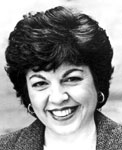|

Judith
Shapiro, President Barnard College
Factors
in Career Choice & Pivotal Point:
“I knew about my vocation as a teacher early,” President Shapiro
says. “My mother was a teacher and as a child I played school.
Remember, I went to college in the early 60s. Women were not thinking
as broadly about their choices. I didn’t consider being a captain
of industry, for example.
“As
a scholar, I think I’m more of an intellectual than a specialist.
It’s hard for me to specialize. I think I’ve chosen my career
moves as ways of moving away from doing just that. I’d much rather
broaden my experience.”
Perhaps it was that fateful lunch with Bryn Mawr’s President Pat
McPherson, now a vice-president at the Mellon Foundation, that
propelled Dr. Shapiro into a career path that ultimately led her
to the presidency of Barnard College. “It’s not so much that I
chose my particular career as it chose me,” she recalls. “Pat
McPherson asked me to be acting dean of the undergraduate college
at Bryn Mawr. It was a pivotal moment. At the time, I was a senior
faculty member and chairman of the anthropology department. It
was a low-risk way to try being a college administrator and it
was not a difficult decision to make.”
Achievements:
After serving as acting dean for a year, Dr. Shapiro went on to
become the college’s provost for 8 years. Then, in 1994, she was
selected to head Barnard College, the women’s college affiliated
with Columbia University.
It was the latest leap in the career of the former history major
at Brandeis University who earned a Ph.D. in anthropology from
Columbia and was the first female anthropologist at the University
of Chicago. Her training remains a powerful influence. “There’s
a way in which, when you’re an anthropologist, you’re always an
anthropologist,” she reflects. “It’s a way of looking at the world.”
Among her proudest achievements, says Shapiro, “is the presidency
of Barnard. It’s the high point of my professional life. When
I came here, it was a very specific move to a specific place.
Ideally, a president is a living embodiment of the institution
and its values.” Among her accomplishments at Barnard, Shapiro
takes special pride in “maintaining and building on Barnard’s
relationship with Columbia, establishing relationships with the
faculty, and developing the college financially.”
Obstacles:
In addition to the obstacles faced by anyone as successful as
Dr. Shapiro, gender was also a factor. “I had no women among the
faculty who taught me,” she concedes. “At Chicago, I was young,
insecure, and not established. I hadn’t finished my dissertation.
Everybody in my department was a male, senior faculty member.
It was intimidating.”
Advice:
Based on her experiences, Dr. Shapiro would urge young women to
“understand that life doesn’t follow a straight path; that it’s
not mapped out. I would like them to think about how long they’ll
live, and realize that they don’t have to cram their entire life
into the next several years. We’re front-loading our lives just
as our lives are getting longer. I would hope they would look
for the best way to combine their career and family goals.”
Mentors:
Dr. Shapiro credits her mother with being a powerful influence
and mentor in her life. “My mother worked. She got dressed nicely
to go to work, not just for her husband. Many feminists are conflicted
about their mothers and may see them as victims. I’ve always felt
support and drawn inspiration from my mother.” Other strong influences
include Pat McPherson, Herbert Marcuse and other faculty at Brandeis,
who gave Dr. Shapiro “very positive images of intellectuals. I
always had warm feelings about the academic world.”
Goals:
Dr. Shapiro is looking forward to remaining at Barnard College
for the next few years, and anticipates an active and involved
retirement in which she’ll travel widely, spend time with close
friends and family, and hopes to work with various non-profit
organizations, particularly National Public Radio.
Education Update, Inc., P.O. Box 20005, New York, NY 10001. Tel:
(212) 481-5519. Fax: (212) 481-3919. Email: ednews1@aol.com.
All material is copyrighted and may not be printed without express consent of
the publisher. © 2001.
|

